Rising Stars 2024 Candidates
ISSCC 2024 and SSCS Women in Circuits proudly present our 24 Rising Stars! Please check out their short bios below:
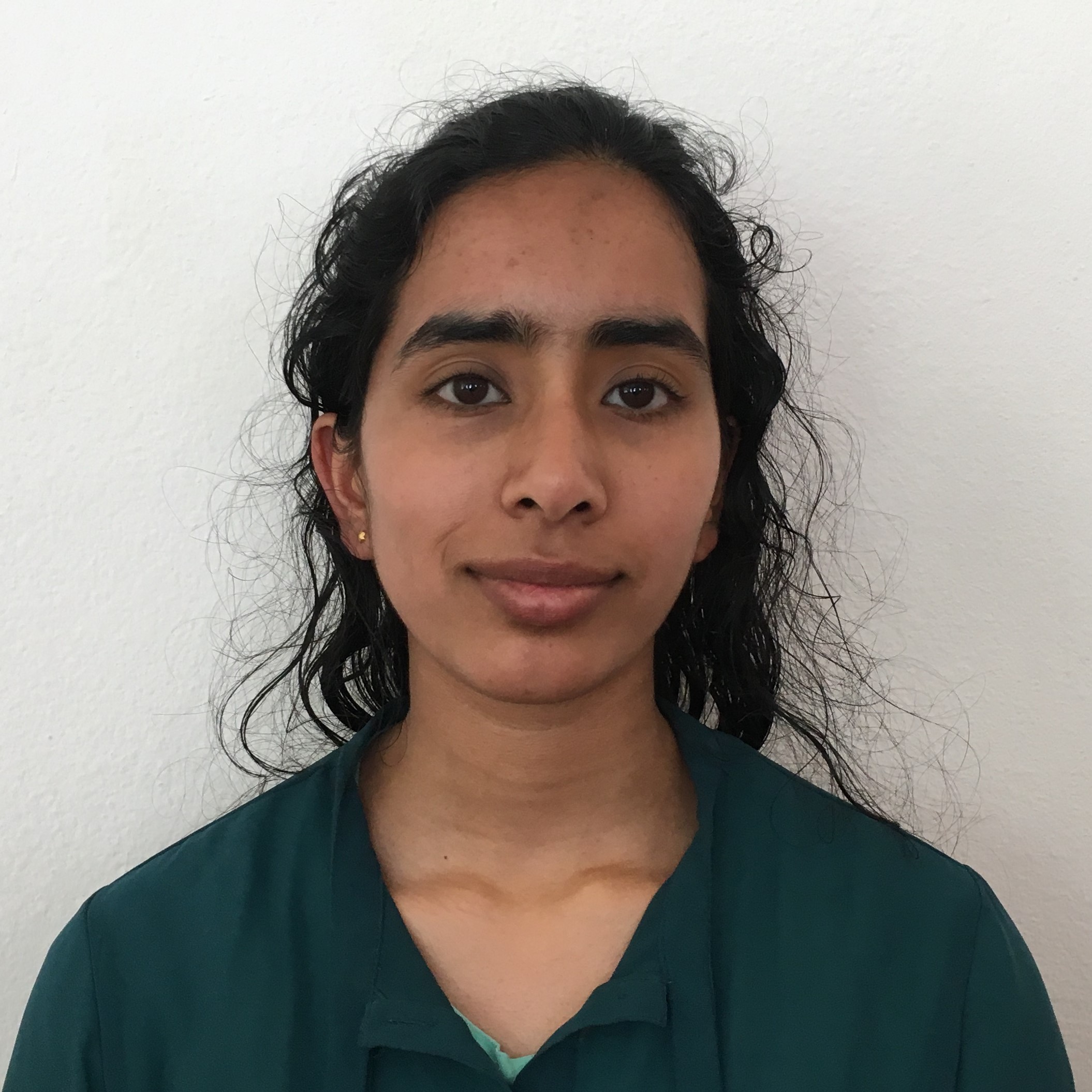 Maitreyi Ashok, PhD Graduate Student, MIT, MA Maitreyi Ashok is pursuing her Ph.D. in Electrical Engineering and Computer Science (EECS), supervised by Professor Anantha Chandrakasan, at the Massachusetts Institute of Technology (MIT), Cambridge, MA. She received her B.S. in Electrical Engineering from the California Institute of Technology in 2019 and her M.S. in EECS from MIT in 2021. Her research focuses on hardware security in digital and mixed-signal integrated circuits against physical attacks including hardware trojan insertion and passive sidechannels. Maitreyi Ashok, PhD Graduate Student, MIT, MA Maitreyi Ashok is pursuing her Ph.D. in Electrical Engineering and Computer Science (EECS), supervised by Professor Anantha Chandrakasan, at the Massachusetts Institute of Technology (MIT), Cambridge, MA. She received her B.S. in Electrical Engineering from the California Institute of Technology in 2019 and her M.S. in EECS from MIT in 2021. Her research focuses on hardware security in digital and mixed-signal integrated circuits against physical attacks including hardware trojan insertion and passive sidechannels. |
|
|
 Damla Dimlioglu, PhD Graduate Student, Cornell University, NY Damla received the B.S. degree in Electrical & Electronics Engineering with a minor in Solid-State Physics from Middle East Technical University, Turkey in 2012 and the M.S. degree in Electrical Engineering with a minor in Semiconductor Devices and Physics from the University of California, Davis, CA in 2015. Her M.S. research focused on novel high-speed and low-power SAR ADC architectures based on time-to-digital conversion. She is currently pursuing her Ph.D. degree at Cornell University, NY focusing on mmWave NPath Mixers for Interference Tolerant Receivers on CMOS, SiGe, and GaN technologies for high data-rate wireless communications and sensing. In 2023, she demonstrated the first GaN N-path passive mixer-first receiver front-end ever reported to date under the advisement of Prof. Al Molnar and presented directly to the Head of NIST overseeing the CHIPS Act under the Secretary of Commerce. Prior to joining Cornell, she was an R&D mmWave IC design intern at Next Generation Radio Integration Lab at Intel Labs, OR in 2019 working on Nonlinear Distortions in mmWave Phased Array Transceivers. She worked on tunable PLLs at Analog Devices, CA (2015), high-speed optical modulator drivers at Bell Laboratories, NJ (2016), and the bandwidth extension techniques for the broadband amplifiers at Intel Labs, OR (2017). She is a reviewer for the IEEE Solid-State Circuits Letters (SSC-L), IEEE Transactions on Circuits and SystemsI (TCAS-I), IEEE Journal of Microwaves (JMW), and IEEE Transactions on Microwave Theory and Techniques (T-MTT). She has been the IEEE SSCS Young Professional Student Representative since 2016. Damla has been a member of the MTT-S TC-14 Microwave and Millimeter-Wave Integrated Circuits Committee and the IMS Technical Program Review Committee (IMS TPRC) since 2021. She has been serving on the IMS Early Career Paper Competition Committee since 2023, as well. Damla Dimlioglu, PhD Graduate Student, Cornell University, NY Damla received the B.S. degree in Electrical & Electronics Engineering with a minor in Solid-State Physics from Middle East Technical University, Turkey in 2012 and the M.S. degree in Electrical Engineering with a minor in Semiconductor Devices and Physics from the University of California, Davis, CA in 2015. Her M.S. research focused on novel high-speed and low-power SAR ADC architectures based on time-to-digital conversion. She is currently pursuing her Ph.D. degree at Cornell University, NY focusing on mmWave NPath Mixers for Interference Tolerant Receivers on CMOS, SiGe, and GaN technologies for high data-rate wireless communications and sensing. In 2023, she demonstrated the first GaN N-path passive mixer-first receiver front-end ever reported to date under the advisement of Prof. Al Molnar and presented directly to the Head of NIST overseeing the CHIPS Act under the Secretary of Commerce. Prior to joining Cornell, she was an R&D mmWave IC design intern at Next Generation Radio Integration Lab at Intel Labs, OR in 2019 working on Nonlinear Distortions in mmWave Phased Array Transceivers. She worked on tunable PLLs at Analog Devices, CA (2015), high-speed optical modulator drivers at Bell Laboratories, NJ (2016), and the bandwidth extension techniques for the broadband amplifiers at Intel Labs, OR (2017). She is a reviewer for the IEEE Solid-State Circuits Letters (SSC-L), IEEE Transactions on Circuits and SystemsI (TCAS-I), IEEE Journal of Microwaves (JMW), and IEEE Transactions on Microwave Theory and Techniques (T-MTT). She has been the IEEE SSCS Young Professional Student Representative since 2016. Damla has been a member of the MTT-S TC-14 Microwave and Millimeter-Wave Integrated Circuits Committee and the IMS Technical Program Review Committee (IMS TPRC) since 2021. She has been serving on the IMS Early Career Paper Competition Committee since 2023, as well. |
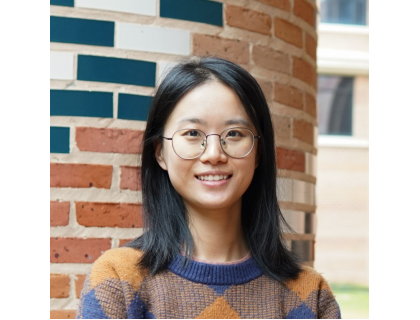 Yingying Fan, PhD Graduate Student, Rice University, TX Yingying Fan received her B.E. degree in Information Science and Engineering from Southeast University, Nanjing, China, in 2017, and her M.S. degree in Electrical and Computer Engineering from University of Michigan, Ann Arbor, in 2019. Since September 2019, She started pursuing her Ph.D. degree in Electrical and Computer Engineering under the supervision of Dr. Taiyun Chi at Rice University. Her research interests include integrated bio-sensors, bio-actuators and biology-electronics hybrid systems for health care applications, brain–computer interface and brain neuromodulation. She was a recipient of the 2021 IEEE MTT-S Graduate Fellowship Award for Medical Applications, RFIC’21 NSF Student Conference Registration Awards, Cadence Women in Technology Scholarship, 2022 IEEE SSCS Predoctoral Achievement Award, and 2023 ISSCC Travel Award. Yingying Fan, PhD Graduate Student, Rice University, TX Yingying Fan received her B.E. degree in Information Science and Engineering from Southeast University, Nanjing, China, in 2017, and her M.S. degree in Electrical and Computer Engineering from University of Michigan, Ann Arbor, in 2019. Since September 2019, She started pursuing her Ph.D. degree in Electrical and Computer Engineering under the supervision of Dr. Taiyun Chi at Rice University. Her research interests include integrated bio-sensors, bio-actuators and biology-electronics hybrid systems for health care applications, brain–computer interface and brain neuromodulation. She was a recipient of the 2021 IEEE MTT-S Graduate Fellowship Award for Medical Applications, RFIC’21 NSF Student Conference Registration Awards, Cadence Women in Technology Scholarship, 2022 IEEE SSCS Predoctoral Achievement Award, and 2023 ISSCC Travel Award. |
|
|
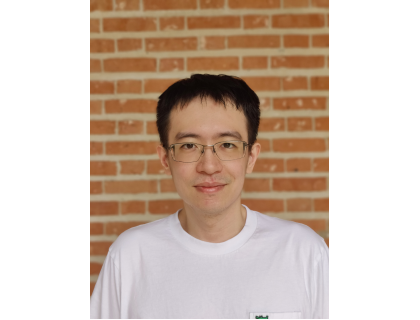 Yan He, PhD Graduate Student, Rice University, TX Yan He received the B.S degree in electronic science and technology from the Zhejiang University, Hangzhou, China, in 2018. He is currently pursuing the Ph.D. degree in electrical and computer engineering with the Rice University, Houston, TX, USA. His current research interests include analog and mixed-signal integrated circuits design for power management and hardware security. Yan is a recipient of 2021 IEEE Solid-State Circuits Society (SSCS) Predoctoral Achievement Award, and 2021 IEEE Custom Integrated Circuit Conference (CICC) Best Paper Awards. He served as a reviewer of multiple IEEE journals including Journal of Solid-State Circuits (JSSC), IoT Journal (IoT-J), Transactions on Dependable and Secure Computing (TDSC), Transactions on VLSI Systems (TVLSI), Transactions on Circuits and Systems I: Regular Papers (TCAS-I) and Transactions on Circuits and Systems II: Express Briefs (TCASII). Yan He, PhD Graduate Student, Rice University, TX Yan He received the B.S degree in electronic science and technology from the Zhejiang University, Hangzhou, China, in 2018. He is currently pursuing the Ph.D. degree in electrical and computer engineering with the Rice University, Houston, TX, USA. His current research interests include analog and mixed-signal integrated circuits design for power management and hardware security. Yan is a recipient of 2021 IEEE Solid-State Circuits Society (SSCS) Predoctoral Achievement Award, and 2021 IEEE Custom Integrated Circuit Conference (CICC) Best Paper Awards. He served as a reviewer of multiple IEEE journals including Journal of Solid-State Circuits (JSSC), IoT Journal (IoT-J), Transactions on Dependable and Secure Computing (TDSC), Transactions on VLSI Systems (TVLSI), Transactions on Circuits and Systems I: Regular Papers (TCAS-I) and Transactions on Circuits and Systems II: Express Briefs (TCASII). |
 Soyeon Kim, PhD Graduate Student, KAIST, Korea Soyeon Kim (Graduate Student Member, IEEE) received the B.S. and M.S. degree from the School of Electrical Engineering, Korea Advanced Institute of Science and Technology (KAIST), Daejeon, South Korea, in 2019 and 2021, where she is currently pursuing the Ph.D. degree. Her research interests include energy-efficient deep learning processor design and intelligent computer vision systems. Soyeon Kim, PhD Graduate Student, KAIST, Korea Soyeon Kim (Graduate Student Member, IEEE) received the B.S. and M.S. degree from the School of Electrical Engineering, Korea Advanced Institute of Science and Technology (KAIST), Daejeon, South Korea, in 2019 and 2021, where she is currently pursuing the Ph.D. degree. Her research interests include energy-efficient deep learning processor design and intelligent computer vision systems. |
|
|
|
|
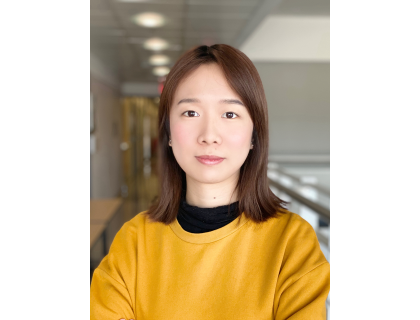 Qijun Liu, PhD Graduate Student, Boston University, MA Qijun's ongoing research endeavors encompass interdisciplinary domains, primarily focusing on developing fully integrated hardware solutions coupled with application-specific algorithms. Collaborating closely with MIT's Biological Engineering and Mechanical Engineering departments, her research project focuses on creating an ingestible micro-bio-electronic device that detects biomarkers associated with diverse gastrointestinal diseases by leveraging engineered biomarkers. This device's intrinsic capability for complete integration establishes a scalable design platform that supports massively parallel biomarker measurements via miniaturized bioelectronic sensing systems. Furthermore, Qijun is actively engaged in a collaborative project with the Biomedical Engineering department at BU, wherein she is involved in developing a modular droplet microfluidic device. This innovative device facilitates the encapsulation of cells within aqueous droplets, emulsified within an oil-filled microfluidic channel, all while incorporating embedded CMOS electronic sensors. This novel approach expedites the exploration of the biological design space across various environments, ultimately enhancing biosensor performance to achieve target sensitivity, specificity, and durability under application-specific conditions. Qijun Liu, PhD Graduate Student, Boston University, MA Qijun's ongoing research endeavors encompass interdisciplinary domains, primarily focusing on developing fully integrated hardware solutions coupled with application-specific algorithms. Collaborating closely with MIT's Biological Engineering and Mechanical Engineering departments, her research project focuses on creating an ingestible micro-bio-electronic device that detects biomarkers associated with diverse gastrointestinal diseases by leveraging engineered biomarkers. This device's intrinsic capability for complete integration establishes a scalable design platform that supports massively parallel biomarker measurements via miniaturized bioelectronic sensing systems. Furthermore, Qijun is actively engaged in a collaborative project with the Biomedical Engineering department at BU, wherein she is involved in developing a modular droplet microfluidic device. This innovative device facilitates the encapsulation of cells within aqueous droplets, emulsified within an oil-filled microfluidic channel, all while incorporating embedded CMOS electronic sensors. This novel approach expedites the exploration of the biological design space across various environments, ultimately enhancing biosensor performance to achieve target sensitivity, specificity, and durability under application-specific conditions. |
|
|
 Gianna Paulin, PhD Graduate Student, ETH Zurich, Switzerland Gianna Paulin is a PhD candidate under the supervision of Prof. Dr. Luca Benini at ETH Zurich, Switzerland. During her PhD, she focused on various compute architectures to accelerate neural networks and was involved in more than seven tape-outs, including one passive silicon interposer in five different technologies. NE16, a direct derivative of one of her accelerators was integrated into the commercial GAP9 product from GreenWaves Technologies. In the last two years, she led a team of more than 15 PhD students to design and tape out a RISC-V-based 2.5D integrated dual-chiplet system. Furthermore, she and her team won the AMD/Xilinx Open Hardware competition in the PhD category in 2023. In her still young career, she participates already as a TPC member for the ESSDERC-ESSCIRC conference. Gianna Paulin, PhD Graduate Student, ETH Zurich, Switzerland Gianna Paulin is a PhD candidate under the supervision of Prof. Dr. Luca Benini at ETH Zurich, Switzerland. During her PhD, she focused on various compute architectures to accelerate neural networks and was involved in more than seven tape-outs, including one passive silicon interposer in five different technologies. NE16, a direct derivative of one of her accelerators was integrated into the commercial GAP9 product from GreenWaves Technologies. In the last two years, she led a team of more than 15 PhD students to design and tape out a RISC-V-based 2.5D integrated dual-chiplet system. Furthermore, she and her team won the AMD/Xilinx Open Hardware competition in the PhD category in 2023. In her still young career, she participates already as a TPC member for the ESSDERC-ESSCIRC conference. |
|
|
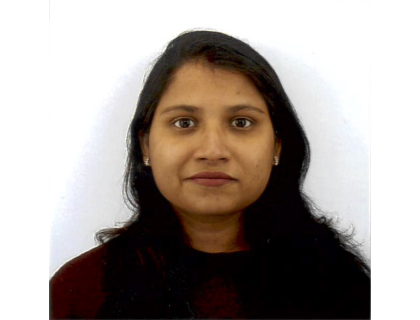 Arpan Suravi Prasad, PhD Graduate Student, ETH Zurich, Switzerland Arpan Suravi Prasad received a B. Tech in Electronics and Communication Engineering from NIT Rourkela in 2015 and graduated among the top 3 students in her branch. She gained industry exposure by working on FPGAs and Xilinx SoCs at Xilinx India. In 2018, she moved to Switzerland to pursue her M.Sc. degree in Electrical Engineering and Information Technology from the Swiss Federal Institute of Technology Zurich, ETH Zürich, Switzerland. In 2021, she started doctoral studies at the Integrated Systems Laboratory at ETH Zürich, Switzerland, under the supervision of Prof. Dr. Luca Benini. Her main interests lie in energy efficient SoC design targeting AR/VR applications at the edge. Her works have resulted in ICs, and publications in DAC, DATE and ESSCIRC conferences. Arpan Suravi Prasad, PhD Graduate Student, ETH Zurich, Switzerland Arpan Suravi Prasad received a B. Tech in Electronics and Communication Engineering from NIT Rourkela in 2015 and graduated among the top 3 students in her branch. She gained industry exposure by working on FPGAs and Xilinx SoCs at Xilinx India. In 2018, she moved to Switzerland to pursue her M.Sc. degree in Electrical Engineering and Information Technology from the Swiss Federal Institute of Technology Zurich, ETH Zürich, Switzerland. In 2021, she started doctoral studies at the Integrated Systems Laboratory at ETH Zürich, Switzerland, under the supervision of Prof. Dr. Luca Benini. Her main interests lie in energy efficient SoC design targeting AR/VR applications at the edge. Her works have resulted in ICs, and publications in DAC, DATE and ESSCIRC conferences. |
|
|
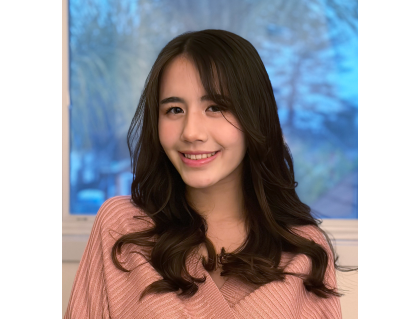 Viansa Schmulbach, Undergraduate Student, UC Berkeley, CA Viansa Schmulbach is a 4th year undergraduate studying EECS at UC Berkeley. She has an interest in computer architecture and digital design. Previously, she has interned as a CPU DV intern at Apple, a Backend and Systems infrastructure at LinkedIn, and a Studio Backend intern at Roblox. She has participated in the tapeout of two digital chips and is currently in the process of helping bring them up. Her current research focuses on chiplet design and custom accelerators. Viansa Schmulbach, Undergraduate Student, UC Berkeley, CA Viansa Schmulbach is a 4th year undergraduate studying EECS at UC Berkeley. She has an interest in computer architecture and digital design. Previously, she has interned as a CPU DV intern at Apple, a Backend and Systems infrastructure at LinkedIn, and a Studio Backend intern at Roblox. She has participated in the tapeout of two digital chips and is currently in the process of helping bring them up. Her current research focuses on chiplet design and custom accelerators. |
|
|
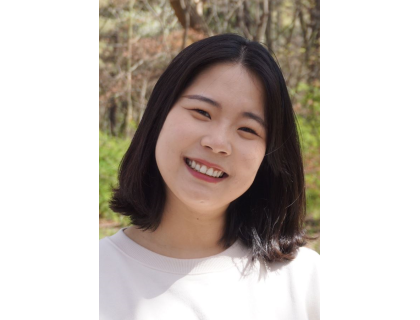 Soyeon Um, PhD Graduate Student, KAIST, Korea Soyeon Um (Graduate Student Member, IEEE) received the B.S. and M.S. degrees from the School of Electrical Engineering, Korea Advanced Institute of Science and Technology, Daejeon, South Korea, in 2020 and 2021, respectively, where she is currently pursuing a Ph.D. degree. Her current research interests include low-power deep learning and intelligent vision system-on-chip (SoC) design, energy-efficient processing-in-memory architecture, and application-specific neuromorphic hardware. Soyeon Um, PhD Graduate Student, KAIST, Korea Soyeon Um (Graduate Student Member, IEEE) received the B.S. and M.S. degrees from the School of Electrical Engineering, Korea Advanced Institute of Science and Technology, Daejeon, South Korea, in 2020 and 2021, respectively, where she is currently pursuing a Ph.D. degree. Her current research interests include low-power deep learning and intelligent vision system-on-chip (SoC) design, energy-efficient processing-in-memory architecture, and application-specific neuromorphic hardware. |
|
|
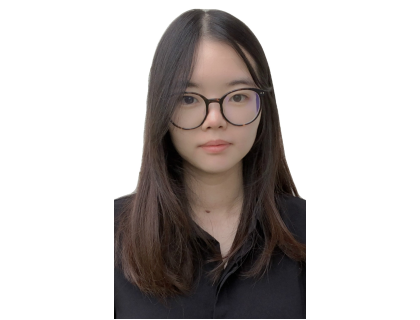 Shanshan Xie, Circuits Research Scientist, Intel, OR Shanshan Xie received the B.S degree in Electrical and Computer Engineering (ECE) from Worcester Polytechnic Institute (WPI), Worcester, MA, USA in 2018 and Ph.D. degree in electrical and computer engineering from The University of Texas at Austin (UT Austin), Austin, TX, USA in 2023. Her research interests include mix-signal design for reliability circuit, compute-in-memory techniques, machine learning accelerator and annealing processor. After graduation from UT Austin, she worked as a circuit research scientist in Reliability & Resilient Circuits team inside Intel Labs. Furthermore, she is one of the TPC members for the digital subcommittee of the IEEE Custom Integrated Circuits Conference (CICC). She was a recipient of 2020 Cadence Women in Technology Scholarship, 2021-2022 SSCS Predoctoral Achievement Award and 2023 ECE Graduate Achievement Award. Shanshan Xie, Circuits Research Scientist, Intel, OR Shanshan Xie received the B.S degree in Electrical and Computer Engineering (ECE) from Worcester Polytechnic Institute (WPI), Worcester, MA, USA in 2018 and Ph.D. degree in electrical and computer engineering from The University of Texas at Austin (UT Austin), Austin, TX, USA in 2023. Her research interests include mix-signal design for reliability circuit, compute-in-memory techniques, machine learning accelerator and annealing processor. After graduation from UT Austin, she worked as a circuit research scientist in Reliability & Resilient Circuits team inside Intel Labs. Furthermore, she is one of the TPC members for the digital subcommittee of the IEEE Custom Integrated Circuits Conference (CICC). She was a recipient of 2020 Cadence Women in Technology Scholarship, 2021-2022 SSCS Predoctoral Achievement Award and 2023 ECE Graduate Achievement Award. |
|
|
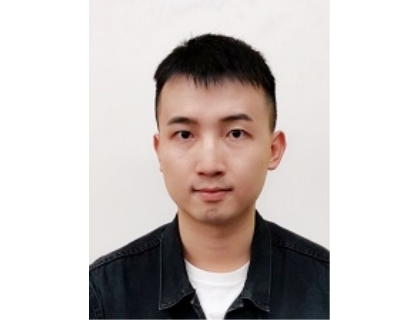 Su Yuqi, Research Scientist, A*STAR, Singapore Yuqi Su (Member, IEEE) received the B.S. degree from Huazhong University of Science and Technology in 2017, the M.S. and the Ph.D. degrees from Nanyang Technological University in 2018 and 2023 respectively. He was a design engineer at MediaTek in 2018 and is now a research scientist at the Institute of Microelectronics, A*STAR, Singapore. His research interests include memory-centric computing circuits and architectures for optimization problems and artificial neural networks using both CMOS and emerging non-volatile memories including MRAM and RRAM. His work resulted in several first-authored IEEE publications at the International Solid-State Circuits Conference (ISSCC), Journal of SolidState Circuits (JSSC), and Custom Integrated Circuits Conference (CICC). He was awarded the ISSCC student travel grants in 2020 and 2022, and SSCS predoctoral achievement award in 2023. He also received the Chinese Government Award for Outstanding Self-financed Students Abroad in 2022. Su Yuqi, Research Scientist, A*STAR, Singapore Yuqi Su (Member, IEEE) received the B.S. degree from Huazhong University of Science and Technology in 2017, the M.S. and the Ph.D. degrees from Nanyang Technological University in 2018 and 2023 respectively. He was a design engineer at MediaTek in 2018 and is now a research scientist at the Institute of Microelectronics, A*STAR, Singapore. His research interests include memory-centric computing circuits and architectures for optimization problems and artificial neural networks using both CMOS and emerging non-volatile memories including MRAM and RRAM. His work resulted in several first-authored IEEE publications at the International Solid-State Circuits Conference (ISSCC), Journal of SolidState Circuits (JSSC), and Custom Integrated Circuits Conference (CICC). He was awarded the ISSCC student travel grants in 2020 and 2022, and SSCS predoctoral achievement award in 2023. He also received the Chinese Government Award for Outstanding Self-financed Students Abroad in 2022. |
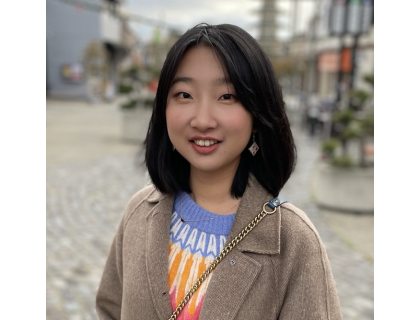 Biqi Rebekah Zhao, PhD Graduate Student, UC Berkeley, CA Biqi Rebekah Zhao received her Bachelor’s degree in Electrical and Computer Engineering and Biomedical Engineering from Carnegie Mellon University in 2018. She is currently a PhD candidate in the department of Electrical Engineering and Computer Sciences at the University of California, Berkeley, under the supervision of professors Michael Lustig, Elad Alon, and Rikky Muller. Her research interests include implantable biosensor integrated system design and magnetic resonance imaging. She is expected to earn her PhD degree in August 2024. Ms. Zhao is the recipient of Outstanding Women in Engineering award from Carnegie Mellon University in 2018, and the 2023 Apple PhD Fellowship in Integrated Systems. Biqi Rebekah Zhao, PhD Graduate Student, UC Berkeley, CA Biqi Rebekah Zhao received her Bachelor’s degree in Electrical and Computer Engineering and Biomedical Engineering from Carnegie Mellon University in 2018. She is currently a PhD candidate in the department of Electrical Engineering and Computer Sciences at the University of California, Berkeley, under the supervision of professors Michael Lustig, Elad Alon, and Rikky Muller. Her research interests include implantable biosensor integrated system design and magnetic resonance imaging. She is expected to earn her PhD degree in August 2024. Ms. Zhao is the recipient of Outstanding Women in Engineering award from Carnegie Mellon University in 2018, and the 2023 Apple PhD Fellowship in Integrated Systems. |
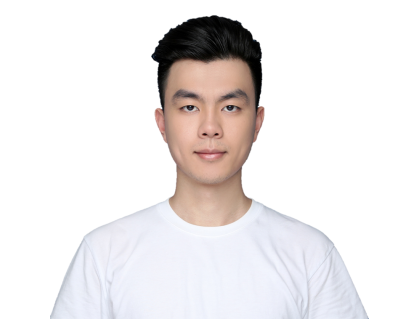 Linran Zhao, PhD Graduate Student, UT Austin Linran Zhao received his B.S. degree from the University of Electronic Science and Technology of China, Chengdu, China, in 2017 and his M.S. degree from the University of California, Irvine, in 2019. From 2019- 2020, he was with ASML, San Jose, as an Analog Design Engineer, where he designed low-noise, high-linearity, high-voltage amplifiers for Scanning E-beam Microscopy applications. During 2020- 2021, he worked as a Graduate Research Assistant in Dr. Yaoyao Jia’s lab at the Department of Electrical and Computer Engineering at North Carolina State University. Currently, he is pursuing his Ph.D. degree with the Laboratory of Dr. Yaoyao Jia at the Department of Electrical and Computer Engineering at The University of Texas at Austin. In the summer of 2022, He worked as an Analog Design Intern with Kilby Lab in Texas Instrument. During the internship, he worked on the zero-power wireless data link design for isolation power products. His research interest includes analog/mixed-signal integrated circuits, power management integrated circuits, energy harvesting, and wireless systems for implantable and wearable biomedical devices and neural interface devices. Mr. Zhao was the finalist of the 2022 Qualcomm Innovation Fellowship. He was the recipient of the Wilson - Tayabali Family Fellowship in 2022, the ISSCC2022 Student Travel Award in 2022, NC State University Summer Graduate Merit Award in 2020, and the First Prize of the TI Undergraduate Circuits Design Competition in 2015. He serves as the Reviewer of IEEE Transactions on Biomedical Circuits and Systems (TBioCAS), IEEE International Symposium on Circuits and Systems (ISCAS), IEEE Biomedical Circuits and Systems (BioCAS), and the International Engineering in Medicine & Biology Conference (EMBC). Linran Zhao, PhD Graduate Student, UT Austin Linran Zhao received his B.S. degree from the University of Electronic Science and Technology of China, Chengdu, China, in 2017 and his M.S. degree from the University of California, Irvine, in 2019. From 2019- 2020, he was with ASML, San Jose, as an Analog Design Engineer, where he designed low-noise, high-linearity, high-voltage amplifiers for Scanning E-beam Microscopy applications. During 2020- 2021, he worked as a Graduate Research Assistant in Dr. Yaoyao Jia’s lab at the Department of Electrical and Computer Engineering at North Carolina State University. Currently, he is pursuing his Ph.D. degree with the Laboratory of Dr. Yaoyao Jia at the Department of Electrical and Computer Engineering at The University of Texas at Austin. In the summer of 2022, He worked as an Analog Design Intern with Kilby Lab in Texas Instrument. During the internship, he worked on the zero-power wireless data link design for isolation power products. His research interest includes analog/mixed-signal integrated circuits, power management integrated circuits, energy harvesting, and wireless systems for implantable and wearable biomedical devices and neural interface devices. Mr. Zhao was the finalist of the 2022 Qualcomm Innovation Fellowship. He was the recipient of the Wilson - Tayabali Family Fellowship in 2022, the ISSCC2022 Student Travel Award in 2022, NC State University Summer Graduate Merit Award in 2020, and the First Prize of the TI Undergraduate Circuits Design Competition in 2015. He serves as the Reviewer of IEEE Transactions on Biomedical Circuits and Systems (TBioCAS), IEEE International Symposium on Circuits and Systems (ISCAS), IEEE Biomedical Circuits and Systems (BioCAS), and the International Engineering in Medicine & Biology Conference (EMBC). |


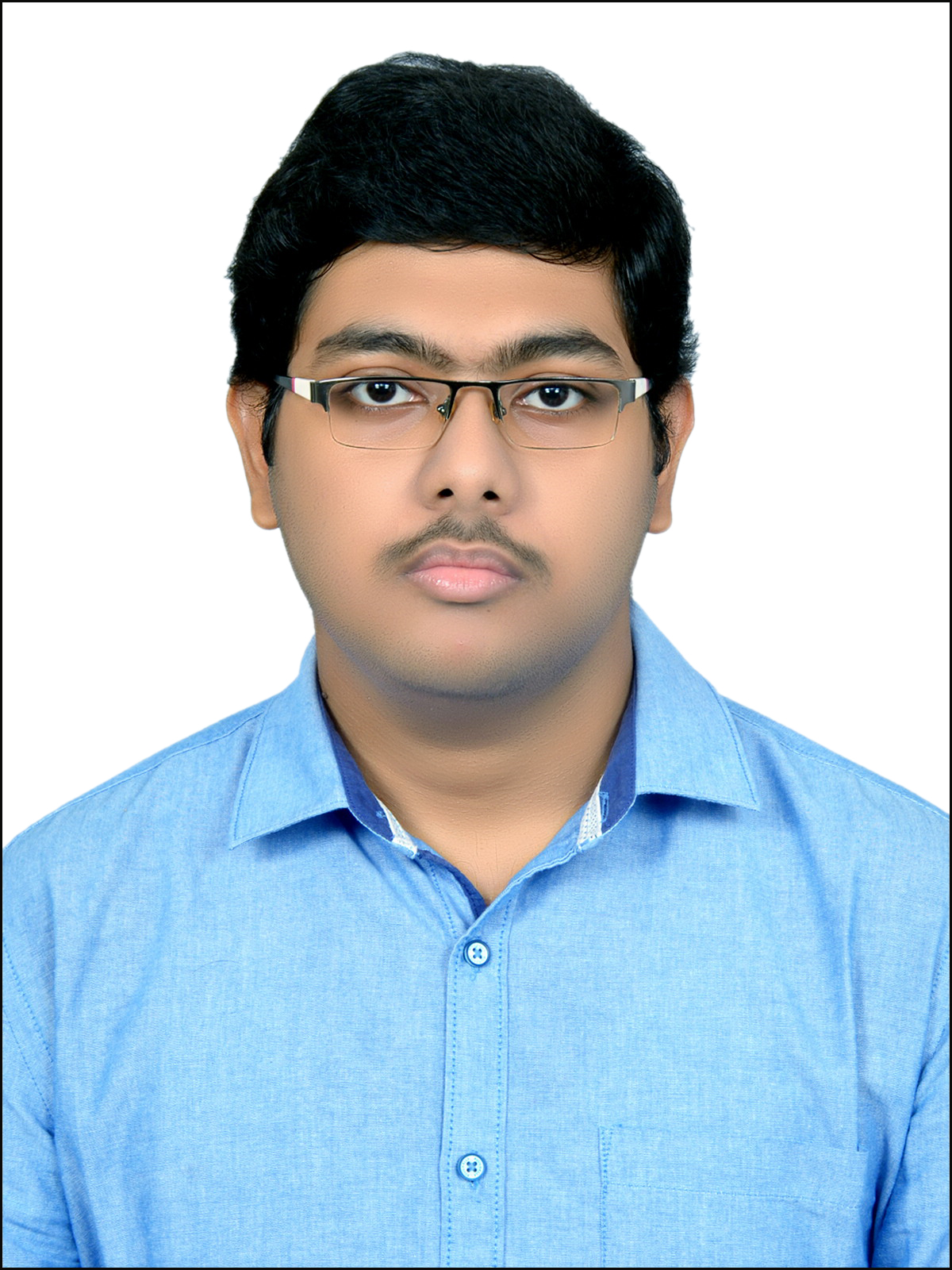 Arnab Dey, Analog Design Engineer, Texas Instruments, Bangalore, India
Arnab Dey, Analog Design Engineer, Texas Instruments, Bangalore, India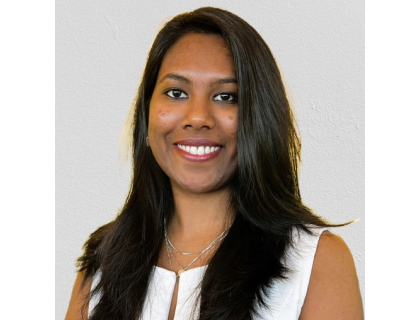 Ashwini Pondeycherry Ganesh, PhD Graduate Student, North Carolina State University, NC Ashwini Ganesh received her M.S. in Electrical Engineering from NC State University in Dec 2022. She is currently a first-year Ph.D. student at NC State University where she continues to explore her research interests in phased arrays and interference mitigation techniques at mmWave frequencies. She actively champions women's empowerment and has provided mentorship to numerous students interested in pursuing careers in STEM. Her dedication and outstanding contributions have been acknowledged, as she was honored with the prestigious COE Doctoral Scholar Year Award – 2023 in the category of citizenship and service.
Ashwini Pondeycherry Ganesh, PhD Graduate Student, North Carolina State University, NC Ashwini Ganesh received her M.S. in Electrical Engineering from NC State University in Dec 2022. She is currently a first-year Ph.D. student at NC State University where she continues to explore her research interests in phased arrays and interference mitigation techniques at mmWave frequencies. She actively champions women's empowerment and has provided mentorship to numerous students interested in pursuing careers in STEM. Her dedication and outstanding contributions have been acknowledged, as she was honored with the prestigious COE Doctoral Scholar Year Award – 2023 in the category of citizenship and service. 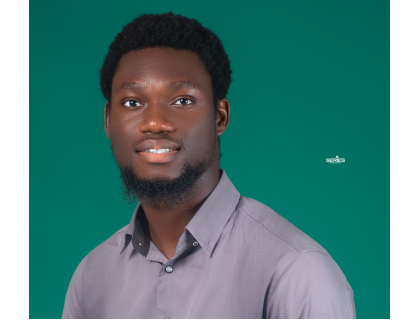 Emmanuel Innocent, Undergraduate, Obafemi Awolowo University, Nigeria Emmanuel Innocent, a senior-year undergraduate pursuing a BSc in Electronic and Electrical Engineering at Obafemi Awolowo University, Nigeria, is dedicated to advancing his expertise in the fields of solid-state circuits and devices. Recognizing the pivotal role of ICs in essential aspects of human life, he is driven to contribute to Africa's development through expertise in these fields. As a research assistant in the Semiconductor Research Laboratory in his department, Emmanuel engages in research spanning materials, devices, and solid-state circuits. His current project focuses on designing a programmable gain amplifier, a crucial component for signal conditioning circuitry. Looking forward, Emmanuel plans to delve into specialised technical topics, including low-power IC design techniques, solid-state and quantum materials and devices, compute-in-memory chips, and flexible electronics. Emmanuel's dedication and achievements have earned him the distinction of being the sole recipient from an African university in the IEEE SSCS Student Travel Grant Award (STGA) program. He represented Africa at the International Solid-State Circuit Conference (ISSCC 2023) in San Francisco. Beyond his technical skills, Emmanuel is a leader, mentor, and valued team player. His team's paper received recognition as the second-best in the postgraduate and undergraduate category at the IEEE PowerAfrica Conference 2022. He is dedicated to teaching Microelectronics and other challenging courses to junior colleagues, significantly improving their academic performance.
Emmanuel Innocent, Undergraduate, Obafemi Awolowo University, Nigeria Emmanuel Innocent, a senior-year undergraduate pursuing a BSc in Electronic and Electrical Engineering at Obafemi Awolowo University, Nigeria, is dedicated to advancing his expertise in the fields of solid-state circuits and devices. Recognizing the pivotal role of ICs in essential aspects of human life, he is driven to contribute to Africa's development through expertise in these fields. As a research assistant in the Semiconductor Research Laboratory in his department, Emmanuel engages in research spanning materials, devices, and solid-state circuits. His current project focuses on designing a programmable gain amplifier, a crucial component for signal conditioning circuitry. Looking forward, Emmanuel plans to delve into specialised technical topics, including low-power IC design techniques, solid-state and quantum materials and devices, compute-in-memory chips, and flexible electronics. Emmanuel's dedication and achievements have earned him the distinction of being the sole recipient from an African university in the IEEE SSCS Student Travel Grant Award (STGA) program. He represented Africa at the International Solid-State Circuit Conference (ISSCC 2023) in San Francisco. Beyond his technical skills, Emmanuel is a leader, mentor, and valued team player. His team's paper received recognition as the second-best in the postgraduate and undergraduate category at the IEEE PowerAfrica Conference 2022. He is dedicated to teaching Microelectronics and other challenging courses to junior colleagues, significantly improving their academic performance.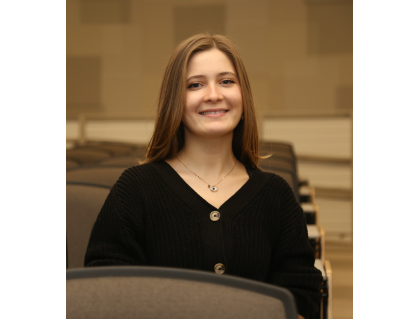 Zeynep Ece Kizilates, PhD Graduate Student, Boston University, MA Zeynep Ece Kizilates received her B.S. degree in 2022 in Electrical and Electronics Engineering at Middle East Technical University (METU) in Ankara, Turkey. She graduated from METU with a high honors degree. Her undergraduate research focused on MEMS device design and characterization. She was awarded a scholarship from TUBITAK for her contributions to the high-resolution capacitive micromachined ultrasonic transducers (CMUTs) ultrasound imaging systems project, and she has studied ultrasound imaging techniques using microbubble contrast agents in the ULTRAMEMS research group. She started her Ph.D. degree in September 2022 at Boston University's Electrical and Computer Engineering department. She is working with Prof. Rabia Tuğçe Yazıcıgil and is a member of the Wireless Integrated Systems and Extreme Circuits (WISE circuits) group. Her ongoing research, in collaboration with MIT and Northeastern University, focuses on developing fully integrated circuits for energy-efficient and secure wireless communication systems. Zeynep's current focus involves designing a hard/soft detection decoder using various Guessing Random Additive Noise Decoding (GRAND) algorithm variants. She was awarded the Dean's Fellowship at BU in 2022, the Circuit Insights award from SSCS, and the IEEE ISIT Student Travel Grant (STG) in 2023.
Zeynep Ece Kizilates, PhD Graduate Student, Boston University, MA Zeynep Ece Kizilates received her B.S. degree in 2022 in Electrical and Electronics Engineering at Middle East Technical University (METU) in Ankara, Turkey. She graduated from METU with a high honors degree. Her undergraduate research focused on MEMS device design and characterization. She was awarded a scholarship from TUBITAK for her contributions to the high-resolution capacitive micromachined ultrasonic transducers (CMUTs) ultrasound imaging systems project, and she has studied ultrasound imaging techniques using microbubble contrast agents in the ULTRAMEMS research group. She started her Ph.D. degree in September 2022 at Boston University's Electrical and Computer Engineering department. She is working with Prof. Rabia Tuğçe Yazıcıgil and is a member of the Wireless Integrated Systems and Extreme Circuits (WISE circuits) group. Her ongoing research, in collaboration with MIT and Northeastern University, focuses on developing fully integrated circuits for energy-efficient and secure wireless communication systems. Zeynep's current focus involves designing a hard/soft detection decoder using various Guessing Random Additive Noise Decoding (GRAND) algorithm variants. She was awarded the Dean's Fellowship at BU in 2022, the Circuit Insights award from SSCS, and the IEEE ISIT Student Travel Grant (STG) in 2023.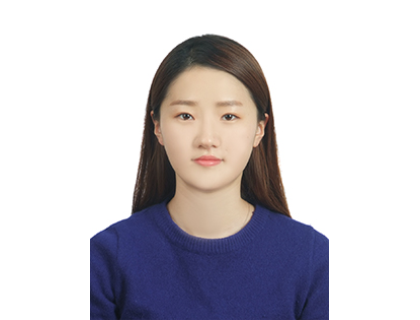 Seonjeong Park, Postdoctoral Fellow, KAIST, Korea Seonjeong Park received the B.S., M.S., and Ph.D. degrees in electrical engineering from the Korea Advanced Institute of Science and Technology (KAIST), Daejeon, South Korea, in 2018, 2020, and 2023, respectively. She is currently a postdoctoral researcher with the School of Electrical Engineering, KAIST. Her current research interests include millimeter-wave integrated circuits in silicon technologies, phased array for radars and wireless communications, and built-in self-test and calibration algorithm for phased array system. Dr. Park was a recipient of a Grand Prize in the 20th Radio Wave Field Graduate Student Thesis Contest in 2021.
Seonjeong Park, Postdoctoral Fellow, KAIST, Korea Seonjeong Park received the B.S., M.S., and Ph.D. degrees in electrical engineering from the Korea Advanced Institute of Science and Technology (KAIST), Daejeon, South Korea, in 2018, 2020, and 2023, respectively. She is currently a postdoctoral researcher with the School of Electrical Engineering, KAIST. Her current research interests include millimeter-wave integrated circuits in silicon technologies, phased array for radars and wireless communications, and built-in self-test and calibration algorithm for phased array system. Dr. Park was a recipient of a Grand Prize in the 20th Radio Wave Field Graduate Student Thesis Contest in 2021. Jade Pikenburg, PhD Graduate Student, UC Berkeley, CA Jade is a second year Ph.D. student in EECS at UC Berkeley advised by Professor Rikky Muller; he also holds a B.S. in Electrical Engineering from Cornell University, where he graduated at the top of his EE class. He is broadly interested in developing integrated circuits for biomedical applications, with a particular focus on miniaturized implantable devices for neuromodulation. His research aims to harness recent scientific discoveries in neuroscience to develop implantable devices to effectively diagnose and treat medical conditions, as well as to enable doctors and scientists to more easily understand the nervous system and its interactions with disease.
Jade Pikenburg, PhD Graduate Student, UC Berkeley, CA Jade is a second year Ph.D. student in EECS at UC Berkeley advised by Professor Rikky Muller; he also holds a B.S. in Electrical Engineering from Cornell University, where he graduated at the top of his EE class. He is broadly interested in developing integrated circuits for biomedical applications, with a particular focus on miniaturized implantable devices for neuromodulation. His research aims to harness recent scientific discoveries in neuroscience to develop implantable devices to effectively diagnose and treat medical conditions, as well as to enable doctors and scientists to more easily understand the nervous system and its interactions with disease.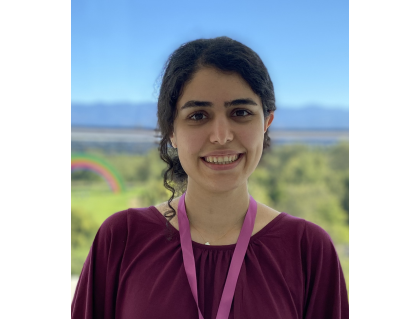 Rozhan Rabbani, PhD Graduate Student, UC Berkeley, CA Rozhan Rabbani received the B.Sc. degree from Sharif University of Technology, Tehran, Iran, in 2018. She is currently working toward a Ph.D. degree with the Department of Electrical and Computer Sciences, University of California Berkeley, Berkeley, CA, USA. She received her Master’s degree in 2023. At Sharif University of Technology, she worked on analog and mixed-signal circuit design to optimize power consumption for a wearable ECG sensor. She interned at Apple Inc. during Summers 2020 and 2022 working on modeling, calibration, and test automation for high-speed applications. Her research at UC Berkeley is focused on developing biomedical circuits and sensors, specifically implantable image sensors for cancer therapy. She was the recipient of the Grace Hopper scholarship in 2021 and the Apple Ph.D. Fellowship in Integrated Circuits in 2022.
Rozhan Rabbani, PhD Graduate Student, UC Berkeley, CA Rozhan Rabbani received the B.Sc. degree from Sharif University of Technology, Tehran, Iran, in 2018. She is currently working toward a Ph.D. degree with the Department of Electrical and Computer Sciences, University of California Berkeley, Berkeley, CA, USA. She received her Master’s degree in 2023. At Sharif University of Technology, she worked on analog and mixed-signal circuit design to optimize power consumption for a wearable ECG sensor. She interned at Apple Inc. during Summers 2020 and 2022 working on modeling, calibration, and test automation for high-speed applications. Her research at UC Berkeley is focused on developing biomedical circuits and sensors, specifically implantable image sensors for cancer therapy. She was the recipient of the Grace Hopper scholarship in 2021 and the Apple Ph.D. Fellowship in Integrated Circuits in 2022.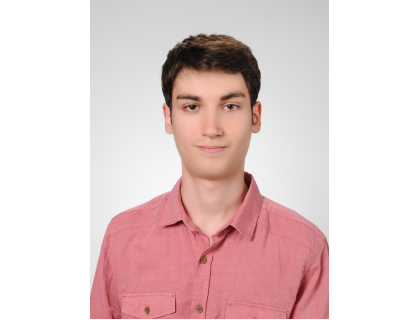 Tuna Berk Tufan, PhD Graduate Student, Worcester Polytechnic Institute (WPI), MA Tuna B. Tufan received the B.S. degree in electrical and electronics engineering from Middle East Technical University, Ankara, Turkey, in 2020 and the M.S. degree in electrical and computer engineering from Worcester Polytechnic Institute, Worcester, MA, USA, in 2022. He interned at Analog Devices as a mixed-signal design engineer during the summer of 2022. He is currently working toward the Ph.D. degree with the Integrated Circuits and Systems (ICAS) Lab at Worcester Polytechnic Institute. His Ph.D. research focuses on the analog and mixed-signal design for wearable, noninvasive sensors for monitoring respiratory functions. Tuna has received travel grant awards for the IEEE International Solid-State Circuits Conference (ISSCC) in 2022 and 2023, as well as the IEEE Custom Integrated Circuits Conference (CICC) in 2022. In 2022, he was recognized as one of the Next-Generation Circuit Designers by the Solid-State Circuit Society (SSCS). He served as a reviewer for multiple IEEE journals, including Transactions on Biomedical Circuits and Systems (TBioCAS) and Transactions on Biomedical Engineering (TBME).
Tuna Berk Tufan, PhD Graduate Student, Worcester Polytechnic Institute (WPI), MA Tuna B. Tufan received the B.S. degree in electrical and electronics engineering from Middle East Technical University, Ankara, Turkey, in 2020 and the M.S. degree in electrical and computer engineering from Worcester Polytechnic Institute, Worcester, MA, USA, in 2022. He interned at Analog Devices as a mixed-signal design engineer during the summer of 2022. He is currently working toward the Ph.D. degree with the Integrated Circuits and Systems (ICAS) Lab at Worcester Polytechnic Institute. His Ph.D. research focuses on the analog and mixed-signal design for wearable, noninvasive sensors for monitoring respiratory functions. Tuna has received travel grant awards for the IEEE International Solid-State Circuits Conference (ISSCC) in 2022 and 2023, as well as the IEEE Custom Integrated Circuits Conference (CICC) in 2022. In 2022, he was recognized as one of the Next-Generation Circuit Designers by the Solid-State Circuit Society (SSCS). He served as a reviewer for multiple IEEE journals, including Transactions on Biomedical Circuits and Systems (TBioCAS) and Transactions on Biomedical Engineering (TBME). 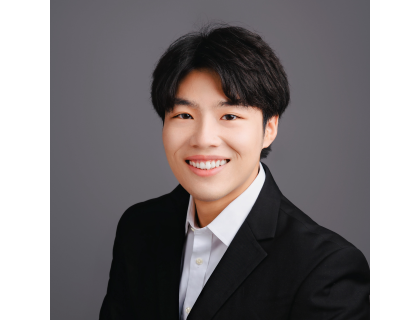 Hanrui Wang, PhD Graduate Student, MIT Hanrui Wang is a final-year Ph.D. student at MIT EECS advised by Prof. Song Han. His research focuses on quantum computer architecture, ML for quantum and ML architecture. His research has been recognized by ACM student research competition 1st place award, best poster award at NSF AI Institute, Best Presentation Award as a DAC Young Fellow and appears in top conferences such as MICRO, HPCA, DAC, ICCAD and NeurIPS. His co-authored papers received QCE Best Paper Award and ICML RL4RL Best Paper Award. He is the recipient of Qualcomm Fellowship, Unitary Fund, and Nvidia Fellowship Finalist. He is the creator of TorchQuantum library which has been adopted by IBM Qiskit Ecosystem and Nvidia cuQuantum Appliance. He is also the co-founder of QuCS lecture series for quantum education.
Hanrui Wang, PhD Graduate Student, MIT Hanrui Wang is a final-year Ph.D. student at MIT EECS advised by Prof. Song Han. His research focuses on quantum computer architecture, ML for quantum and ML architecture. His research has been recognized by ACM student research competition 1st place award, best poster award at NSF AI Institute, Best Presentation Award as a DAC Young Fellow and appears in top conferences such as MICRO, HPCA, DAC, ICCAD and NeurIPS. His co-authored papers received QCE Best Paper Award and ICML RL4RL Best Paper Award. He is the recipient of Qualcomm Fellowship, Unitary Fund, and Nvidia Fellowship Finalist. He is the creator of TorchQuantum library which has been adopted by IBM Qiskit Ecosystem and Nvidia cuQuantum Appliance. He is also the co-founder of QuCS lecture series for quantum education.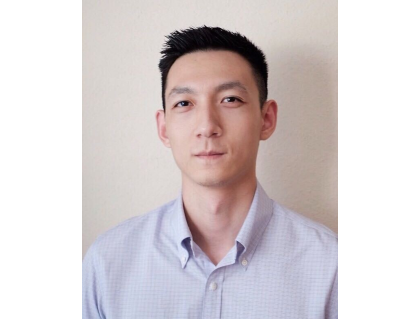 Zhanghao Yu, Analog Design Engineer, Intel, CA Zhanghao Yu received a B.E. degree in integrated circuit design and integrated systems from the University of Electronic Science and Technology of China, Chengdu, China, in 2016, and an M.S. degree in electrical engineering from the University of Southern California, Los Angeles, CA, USA, in 2018. He earned his Ph.D. degree in electrical and computer engineering from Rice University, Houston, TX, USA, in August 2023, under the guidance of Professor Kaiyuan Yang. He worked as an analog design engineering intern at Analog Devices Inc. from May to September 2022. Since September 2023, he has joined Intel as an analog design engineer. His research interests include analog and mixed-signal integrated circuit design for wireless implantable bioelectronics, high-performance SoC, power management and wireless power transfer, low-power communication, and hardware security. He has (co-)first authored seven papers on the Nature Biomedical Engineering, the Journal of Solid-State Circuits (JSSC), the International Solid-State Circuits Conference (ISSCC), the Custom Integrated Circuits Conference (CICC), the Transactions on Biomedical Circuits and Systems (TBioCAS), the Radio Frequency Integrated Circuits Symposium (RFIC), and the Annual International Conference on Mobile Computing and Networking (MobiCom). Dr. Yu was a recipient of the 2021–2022 IEEE Solid-State Circuits Society (SSCS) Predoctoral Achievement Award. As the first author, he received the Best Paper Award at the 2021 CICC, the Best Paper Award at the 28th MobiCom, and the Best Student Paper Finalist at the 2022 RFIC.
Zhanghao Yu, Analog Design Engineer, Intel, CA Zhanghao Yu received a B.E. degree in integrated circuit design and integrated systems from the University of Electronic Science and Technology of China, Chengdu, China, in 2016, and an M.S. degree in electrical engineering from the University of Southern California, Los Angeles, CA, USA, in 2018. He earned his Ph.D. degree in electrical and computer engineering from Rice University, Houston, TX, USA, in August 2023, under the guidance of Professor Kaiyuan Yang. He worked as an analog design engineering intern at Analog Devices Inc. from May to September 2022. Since September 2023, he has joined Intel as an analog design engineer. His research interests include analog and mixed-signal integrated circuit design for wireless implantable bioelectronics, high-performance SoC, power management and wireless power transfer, low-power communication, and hardware security. He has (co-)first authored seven papers on the Nature Biomedical Engineering, the Journal of Solid-State Circuits (JSSC), the International Solid-State Circuits Conference (ISSCC), the Custom Integrated Circuits Conference (CICC), the Transactions on Biomedical Circuits and Systems (TBioCAS), the Radio Frequency Integrated Circuits Symposium (RFIC), and the Annual International Conference on Mobile Computing and Networking (MobiCom). Dr. Yu was a recipient of the 2021–2022 IEEE Solid-State Circuits Society (SSCS) Predoctoral Achievement Award. As the first author, he received the Best Paper Award at the 2021 CICC, the Best Paper Award at the 28th MobiCom, and the Best Student Paper Finalist at the 2022 RFIC.